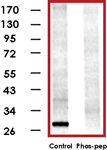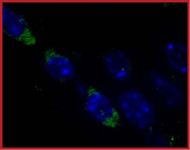
Anti-phospho-14-3-3 beta (Ser58)
Rabbit Polyclonal Antibody
Catalog No. Y71-365R
| Catalog No. | Pack Size | Price (USD) | |
|---|---|---|---|
| Y71-365R-100 | 100 ul | $715 | |
| Y71-365R-BULK | BULK | Contact Us |

Rabbit Polyclonal Antibody
Catalog No. Y71-365R
| Catalog No. | Pack Size | Price (USD) | |
|---|---|---|---|
| Y71-365R-100 | 100 ul | $715 | |
| Y71-365R-BULK | BULK | Contact Us |
Overview:
14-3-3beta is a member of the highly conserved family of 14-3-3 proteins that appear to have multiple roles in cell signaling by binding to phosphoserine-containing proteins (1). 14-3-3 proteins are abundantly expressed in the brain and have been detected in the cerebrospinal fluid of patients with different types of neurological disorders (2). 14-3-3 proteins bind and regulate protein ligands that are typically phosphorylated on serine or threonine residues (3). 14-3-3 proteins affect a diverse array of cellular processes including the cell cycle and transcription, signal transduction and intracellular trafficking. 14-3-3 proteins function as a dimer. Dimerization of the 14-3-3 protein is regulated by site-specific serine phosphorylation (4).
References:
1. Yaffe, M B. et al: The structure basis for 14-3-3:phosphopeptide binding specificity. Cell 1997 91: 961-971.
2. Berg, D. et al.: 14-3-3 Proteins in the nervous system. Nat Rev Neurosci 2003 4:752-762.
3. Silhan, J. et al.: 14-3-3 Protein C-terminal stretch occupies ligand binding groove and is displaced by phosphopeptide binding. J Biol Chem 2004 279:49113-49119.
4. Woodcock, J M. et al: The dimeric versus monomeric status of 14-3-3 zeta is controlled by phosphorylation of Ser58 at the dimer interface. J Biol Chem 2003 278:36323-36327.
Specificity:
Recognizes the 14-3-3 beta protein phosphorylated at serine 58
Cross Reactivity:
Human, Mouse, Rat, Bovine, Canine, Chicken, non-Human Primate, Sheep, Xenopus and Zebrafish
Host:
Rabbit, IgG
Immunogen:
Synthetic phospho-peptide corresponding to amino acid residues surrounding Ser58 conjugated to KLH
Purification:
Affinity Chromatography
Stability:
Store at 4oC (add 0.1% NaN3) for several months, and at -20oC for longer periods. For optimal storage, aliquot target into smaller quantities after centrifugation and store at recommended temperature. For most favorable performance, avoid repeated handling and multiple freeze/thaw cycles.
Sample Data:
Western blot of rat brainstem lysate showing specific immuno-labeling of the ~29k 14-3-3 beta protein phosphorylated at Ser58 (Control). The immunolabeling is blocked by the phosphopeptide used as the antigen (Phos-pep) but not by the corresponding dephosphopeptide (not shown).

|
Sample Data:
Immunofluorescence of 21d mouse brain cryosections showing specific staining of the 14-3-3 beta protein when phosphorylated at Ser58 in green and DNA in blue.

|
There are no related publications available for this product.
AKT/PKB Pathway, Cancer, Cell Cycle, Cellular Stress, ERK/MAPK Pathway, Neurobiology, PKA/PKC Pathway, WNT Signaling
STAY CONNECTED
Fax: 1-604-232-4601